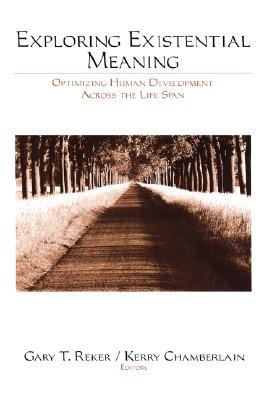| Exploring Existential Meaning: Optimizing Human Development Across the Life Span Contributor(s): Reker, Gary T. (Editor), Chamberlain, Kerry (Editor) |
|
 |
ISBN: 076190994X ISBN-13: 9780761909941 Publisher: Sage Publications OUR PRICE: $90.25 Product Type: Paperback - Other Formats Published: January 1999 Annotation: Cultivating a sense of existential meaning is identified in psychological literature as an important factor in preventing illness, in promoting health, and in successfully adapting to life??'s changing circumstances (resiliency as well as recovery). A lack of this sense of meaning, which the editors refer to as ???existential vacuum???, can form the basis of such disorders and diseases as neurosis, depression, aggression, suicide ideation, and substance abuse. Scholars have studied these relationships for years. But new developments in the field and results of recent qualitative analyses have led to a new focus on how people experience the world and draw meaning from ordinary life. Based on their research over the last ten years, the editors write, ???Existential meaning plays a crucial role in moderating the effects of stress oh physical health and psychological well-being???The role of existential meaning at different stages of life, and at points of transition between stages, has much to teach us about optimal human development across the life span.??? The editors have organized the book into three sections. In the first they and their contributors lay out the foundational models and definitions that are current in the study of existential meaning. Part two emphasizes research methodology, particularly issues relevant to investigation and measurement of questions and experiences of personal meaning (clinical and sociological). The third section offers specific applications of the theories, models, and methodologies presented in the first two parts. |
| Additional Information |
| BISAC Categories: - Psychology | Developmental - Lifespan Development - Psychology | Movements - Existential - Social Science |
| Dewey: 128 |
| LCCN: 99006281 |
| Physical Information: 0.48" H x 6.04" W x 9.18" (0.73 lbs) 240 pages |
| Descriptions, Reviews, Etc. |
| Publisher Description: Both implicit and existential meaning are important constructs in fully understanding human experience. The editors of this volume present a forum for an array of viewpoints and recent research that address the notion of optimal human growth. |
Contributor Bio(s): Chamberlain, Kerry: - Kerry Chamberlain is Professor of Social and Health Psychology at Massey University in Auckland, New Zealand. He is coeditor (with Michael Murray) of Qualitative Health Psychology: Theories and Methods (SAGE), coauthor (with Antonia Lyons) of Health Psychology: A Critical Introduction (Cambridge), and series editor (with Antonia Lyons) for Critical Approaches to Health (Routledge). He serves on the editorial boards of several journals and has published widely on health issues and qualitative research. His current research interests are in poverty, health and illness, medicalisation, food, and the mundane, and innovative methods for qualitative research. Reker, Gary T.: - Gary T. Reker, Ph.D. was born in Hamm, West Germany in 1942. He obtained his B.A. (1965) from McMaster University and his M.A.Sc. (1970) and Ph.D. (1973) from the University of Waterloo. He has been at Trent University since 1972 and retired as Professor Emeritus in Psychology in 2008. He is married to Dorothy and they have three grown daughters and six grandchildren. As a life-span developmental psychologist, his teaching and research interests have focussed on the aging process, specifically on the role of personal meaning in life, optimism, death attitudes, resilience and creative coping in promoting successful aging. He has conceptualized and constructed numerous measuring instruments, has published numerous articles in peer reviewed journals, authored several book chapters, and has edited (with Kerry Chamberlain) a book entitled, "Existential meaning: Optimizing human development across the life span" (Sage, 2000). In 1981 and again in 1986, he was a Fellow of the Andrew Norman Institute for Advanced Studies in Gerontology and Geriatrics at the University of Southern California. In 1999, he was the Visiting Chair in Gerontology at St. Thomas University, Fredericton, New Brunswick. In 2007, he returned to the University of Southern California as a Visiting Scholar. He is actively involved in the Gerontological Society of America, the International Network on Personal Meaning, and the International Institute for Reminiscence and Life Review. |